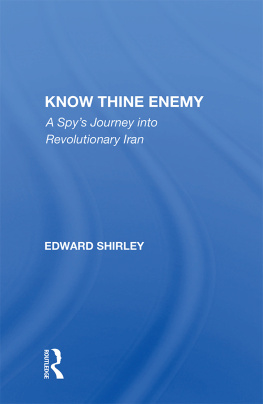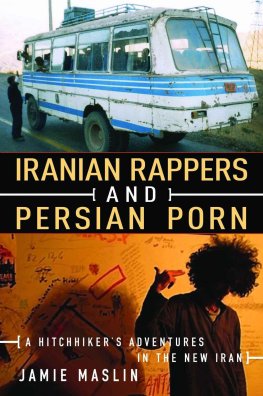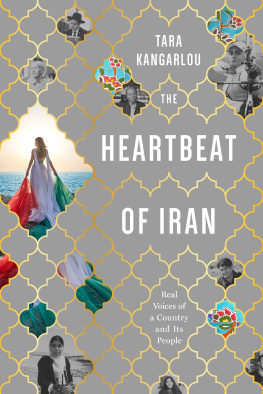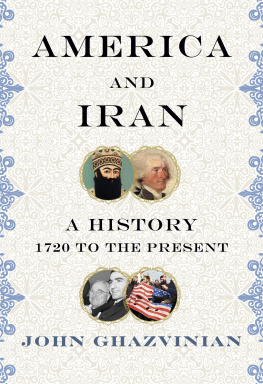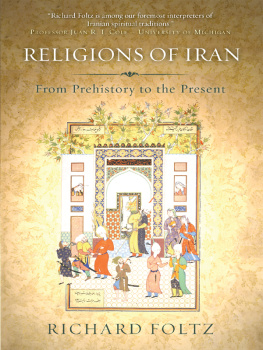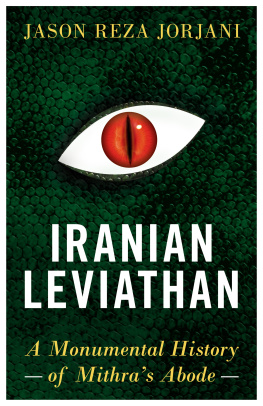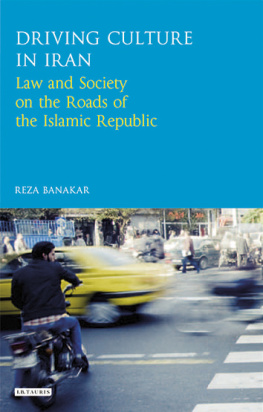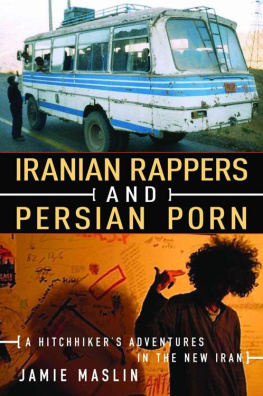First published 1999 by Westview Press
Published 2018 by Routledge
52 Vanderbilt Avenue, New York, NY 10017
2 Park Square, Milton Park, Abingdon, Oxon OX14 4RN
Routledge is an imprint of the Taylor & Francis Group, an informa business
Copyright 1999 by Edward Shirley
All rights reserved. No part of this book may be reprinted or reproduced or utilised in any form or by any electronic, mechanical, or other means, now known or hereafter invented, including photocopying and recording, or in any the publishers.
Notice:
Product or corporate names may be trademarks or registered trademarks, and are used only for identification and explanation without intent to infringe.
Library of Congress Cataloging-in-Publication Data
Shirley, Edward, 1949
Know thine enemy: a spys journey into revolutionary Iran /
Edward Shirley.
p. cm.
Originally published: New York: Farrar, Straus, and Giroux, 1997
ISBN 0-8133-3588-4 (pbk.)
1. IranDescription and travel. 2. IranPolitics and
government1979 . I. Title.
DS259.2.S53 1999
955.05'43dc21 98-43091
CIP
ISBN 13: 978-0-367-00711-9 (hbk)
Istanbul, 1990
Unable to find a taxi, Ahmad had hobbled from his hotel. His destination, the American consulate, isolated by unmarked one-way and dead-end streets, was hard to find. He hadn't noticed the neighborhood's tired beautyits belle epoque apartments and hotels a century in decline. The past had given way to congested streets, honking homicidal drivers, cracked concrete sidewalks, and belly-dancer joints with broken neon signs. When he saw the American flag, machine-gun-toting Turkish guards, pea-green walls, and a visa-information bulletin board in Persian, he saw the Promised Land.
Wet and dirty from the incessant, coal-laden Istanbul winter rain, Ahmad was visibly relieved to see me. He was not your usual Iranian Revolutionary Guardsman: having lost a leg, having lost hope, he wanted to immigrate to America.
When I guided him into my room and asked him in Persian to be seated, Ahmad knew he'd found the man he was looking for. My greeting had reassured him as my predecessors' had not. When Iranians meet an American who speaks Persian, they assume they're meeting the CIA. Among the Middle East's most devout conspirators, they believe that American intelligence is everywhere, all-knowing, and of course Persian-speaking.
Anyone who has crossed paths with the CIA knows the truth is nearly the opposite, but Ahmad's assumption about my employer, at least, was correct. I had come to Turkey to talk to Iranians on behalf of the United States government; I had also come to pursue my own quest to understand better the Muslim mind and soul, particularly its militant Shi'ite Iranian version. I wanted to peel the Persian onionthe obligatory appetizer that resembles the many-layered Persian characterdown to its core.
The Revolutionary Guard Corps, or, as it is known in Persian, the Sepah-e Pasdaran, is the protector and military will of Iran's mollahs. I'd met several ex -Pasdaran in my three years in Istanbul. Most were from the cadre of short-term draftees, Ahmad, however, had been a professional, the hardest of the hard core. He'd traveled by bus from Tehran to Istanbul, a wearying 1,200-mile trip across Iranian Azarbaijan, Kurdistan, and the 700-mile Anatolian plateau. He'd come to Istanbul, like thousands before him, because Iranians do not need visas to cross the frontier. Istanbulwith its foreign consulates, visa forgers, and underground refugee railroadsoffered dissident Iranians the chance of immigration to the West.
"What can I do for you?" I asked Ahmad as he slowly lowered himself into the chair directly facing mine. His worn black polyester suit and graying polyester shirt buttoned at the collar had become the unofficial civilian uniform of Iranian men in the Islamic Republic. When he sank into the heavily cushioned chair, unable to control his descent without his right leg, he grabbed the bulbous armrest hard to regain his balance. I glanced at his folded pants leg, collapsed like an accordion. Four heavy black hand-stitched knots in the corners of the last flap held it together.
He finally raised his face, averting his eyes from mine, a traditional Persian reflex before a foreigner. He had pale-brown skin; a thick, stubby black beard only slightly shorter than the hair on his head grew high on his cheeks. It was the face of a serious fundamentalisteverything paid homage to his eyes. However, Ahmad's eyes were not Khomeini's. They were tired, and they were almost kind.
"I want to see America," he said calmly.
I felt his anxious hope in his lowered eyes, not in his words. Outside my window, I could hear the afternoon visa applicants forming lines in the streets, Iranians and Turks shouting at each other, the former always angry at the latter's quicker entre.
"I like America. I am a friend of America."
"Am I the first American you've ever met?" I asked.
"My older brother knew many Americans before the revolution.
He had many American friends, and he spoke English well, But you are my first American."
There is probably not a single Iranian who does not want to talk to America. The more militant, the stronger the desire for "the Great Satan." Iranians are more attracted to devils than to angels. They are fascinated by America's power, wealth, and optimistic, very un-Iranian dreams. They crave our recognition; our strong approval or our disapproval, or, most confusing, both at the same time. Fascinated by human faults, like their Zoroastrian forefathers they believe life is an open playing field, and Evil has at least an equal chance of winning. So much the better, then, to listen to what Evil has to say.
Ahmad had joined the Guard via the Basij, ragtag outfits of militarily untrained young and old men who backed up the slightly better trained Revolutionary Guard Corps during the eight years of the IranIraq War (1980-88). Basij means "mobilization." Lightly armed except in faith, tens of thousands of Basijis became martyrs against Iraqi minefields, machine guns, tanks, and flaming oil pits. Ahmad became a Basiji and then a Pasdar because he wanted to die for Islam and Khomeini; he also joined up because he was bored.
Ahmad's Tehrana vast peasant ghetto of uneducated young men alternately dreaming of women, wealth, and a new puritan Islamic orderoffered few options. Serving God had seemed easily the most compelling and accessible. Ahmad was sixteen when he entered the Basij, nineteen when he entered the Guard. He had grown up near the Paradise of Zahra cemetery, famous for its martyrs' graves and a fountain that in the early war years spewed blood-red water in tribute to those who gave their lives in battle.
Ahmad had been too young to fight against the Shah or to occupy the American embassy in Tehran. If he'd been a few years older in 1979, when the revolutionaries seized the embassy for the second and last time, Ahmad definitely would have been there. He'd hated America, the Third World's worst oppressor and the backer of the Shah.
"Why do you want to see America?"
"My cousin lives there. In Austin, Texas." He pronounced the name reverently, then unconsciously touched his right hip a few inches above his stitched-up pants leg. "He told me the best doctors in the world are there. I want to walk again, and he told me I could find a new leg in America."

